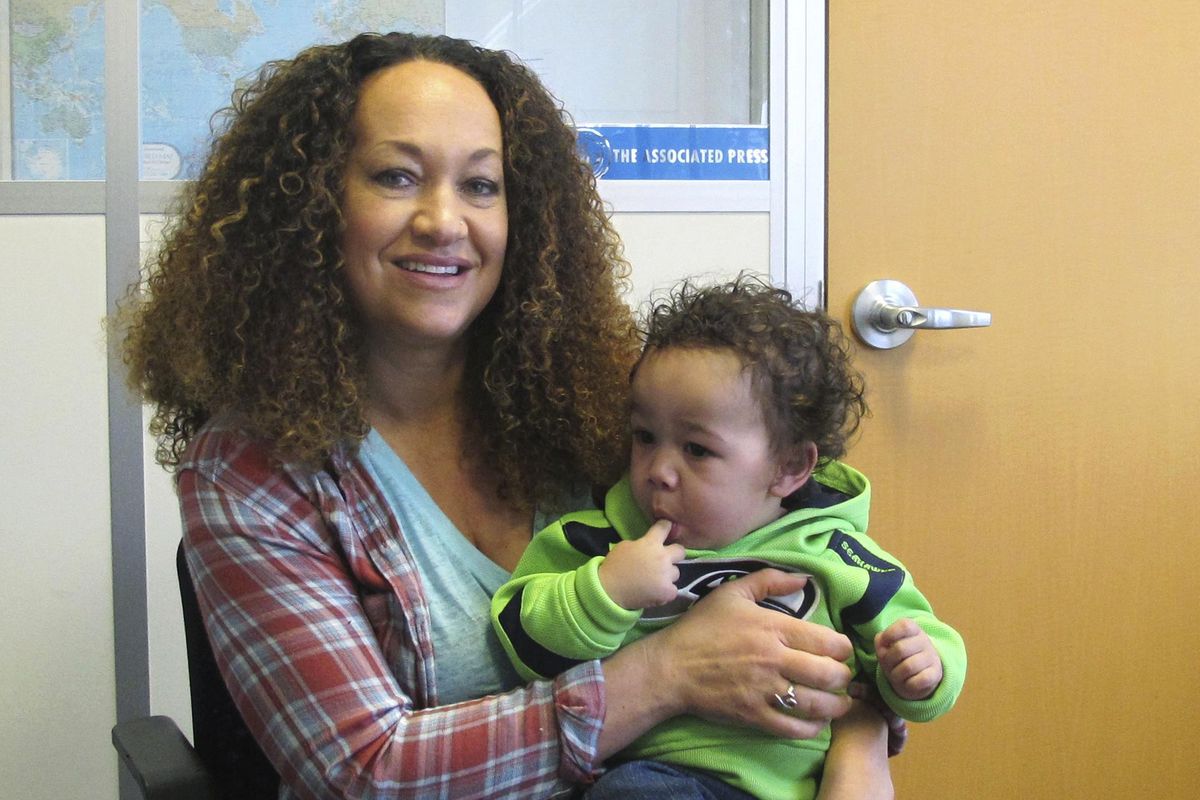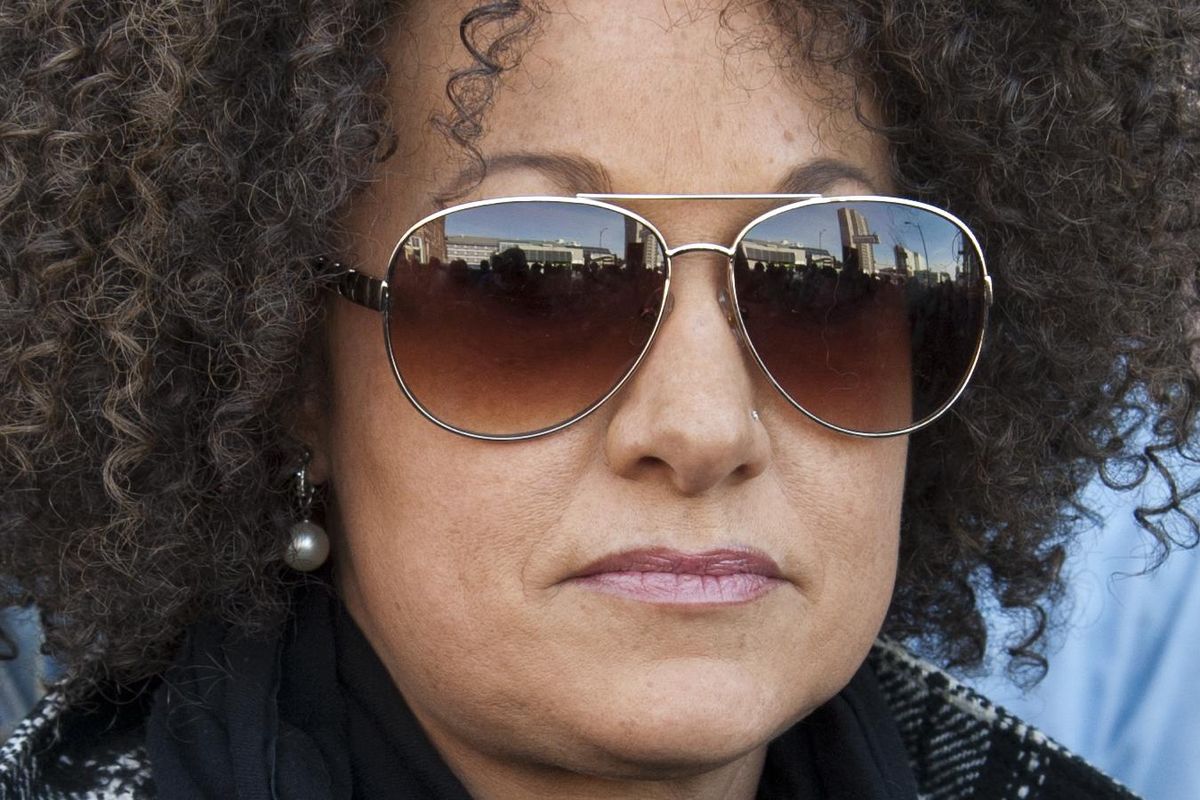Rachel Dolezal documentary ‘The Rachel Divide’ receives mixed reviews; premieres on Netflix Friday
In this March 20, 2017 photo, Rachel Dolezal poses for a photo with her son, Langston in the bureau of the Associated Press in Spokane, Wash. The former NAACP leader, who was born to white parents but posed for years as a black woman, is facing charges of welfare fraud. (Nicholas K. Geranios / AP)
Nearly three years after the name “Rachel Dolezal” became internationally known when it was revealed that the former president of the Spokane chapter of the NAACP, a white woman, had been presenting herself as black, “The Rachel Divide,” a documentary about Dolezal, is putting the name back into the spotlight.
“The Rachel Divide,” directed by Laura Brownson (“Lemon”), was screened Monday at the Tribeca Film Festival and premieres Friday on Netflix.
Over the course of two years, Brownson filmed in Dolezal’s home and around Spokane, interviewing Dolezal and her sons. Brownson interviewed critics, too, including Sandra Williams, editor of the Black Lens, whom the Guardian quotes as saying Dolezal is being “treated the way black people are treated when we raise issues.”
Like most news about Dolezal, who legally changed her name to Nkechi Amare Diallo in 2016, reception to the documentary has been mixed.
In an article headlined “Rachel Dolezal Plays an Exhausting, Self-Centered Victim in Her Netflix Documentary,” entertainment writer Ira Madison III, of the Daily Beast, said there is no new insight into her life, no sign that she’s changed.
“If anything, ‘The Rachel Divide’ highlights how many lives Dolezal has obliterated in her need to be centered in oppression,” Madison said. “She’s not seeking fame, per se … but she is seeking to be the most oppressed person in the world.”
In Variety, Rick Schager writes: “The portrait it paints is sure to confound and infuriate in equal measure. Far from simply a snapshot of a discussion about race, Brownson’s documentary is a riveting account of self-sabotage, misplaced priorities, and obstinacy run amok.”
The Root’s Maiysha Kai had a similar take: “ ‘The Rachel Divide’ doesn’t seek to solve or explain the problem of Rachel Dolezal but to simply observe and reveal her as she is in the pivotal years after her racial ‘outing’ in 2015. Unfortunately, what she is is an unmitigated mess.”
Although she called the documentary a “fascinating and thought-provoking film” in her review of “The Rachel Divide,” which she gave three stars, the Guardian’s Arwa Mahdawi criticized the documentary as being a reminder that conversations about race and identity tend to center on white feelings and stories.
“Ultimately, I’m not sure ‘The Rachel Divide’ really interrogates the reasons why Dolezal is so divisive, so much as it whitewashes them,” she wrote in her review.
Director Brownson, it’s worth noting, is a white woman, though she maintains that she worked to check her biases and privilege while working on this film by “surrounding (herself) with a team who had different points of view.”
“I made this movie because the story is bigger than Rachel,” Brownson told Vulture’s Chris Lee. “I wanted to understand how one person can ignite and continue to fuel a national controversy. Specifically, embedded in those reactions are important issues worth discussing: white privilege, colorism, the underrepresentation of black women in our society, identity – can it be fluid? And can race be added to that list? And if not, why not? Rachel didn’t start this conversation but she’s a vehicle to continue it.”
In a list of films worth seeing at the Tribeca Film Festival, Vulture’s David Edelstein called “The Rachel Divide” a “fine, nuanced, intimate doc,” appreciating the fact that Brownson talked to Dolezal’s critics and “doesn’t shy away from the idea that her subject might be a nut.”
He notes that as the viewer learns about Dolezal’s troubled background, “her physically and emotionally abusive religious-fanatic parents who adopted and then beat black children,” they come away feeling for Dolezal and her children, who he said are like “fellow prisoners.”
But the Daily Beast’s Madison is having none of that, finding no sympathy for Dolezal after watching “The Rachel Divide.”
“She’s still searching for relevance, for a new way for us to notice her and take her down, so that she can get back up again with blood seeping from her palms as if stigmata were real,” he said. “Her book flopped and I pray this documentary flops too and interest in her utterly boring and self-victimizing story fades away, lest I ever have to write about this woman again.”

